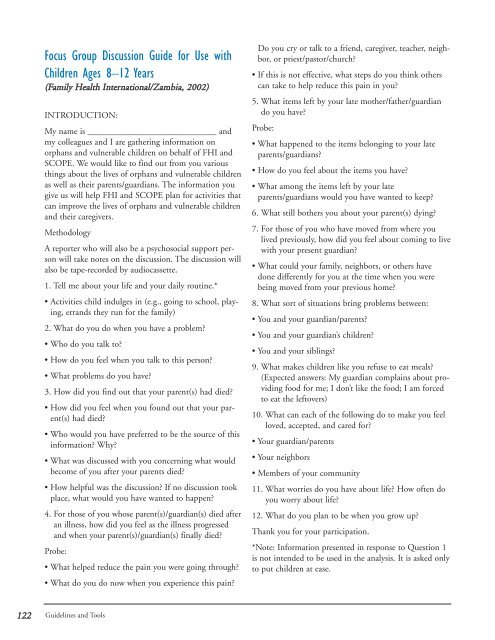Conducting a Participatory Situation Analysis of.pdf - Global HIV ...
Conducting a Participatory Situation Analysis of.pdf - Global HIV ...
Conducting a Participatory Situation Analysis of.pdf - Global HIV ...
Create successful ePaper yourself
Turn your PDF publications into a flip-book with our unique Google optimized e-Paper software.
Focus Group Discussion Guide for Use with<br />
Children Ages 8–12 Years<br />
(Family Health International/Zambia, 2002)<br />
INTRODUCTION:<br />
My name is _____________________________ and<br />
my colleagues and I are gathering information on<br />
orphans and vulnerable children on behalf <strong>of</strong> FHI and<br />
SCOPE. We would like to find out from you various<br />
things about the lives <strong>of</strong> orphans and vulnerable children<br />
as well as their parents/guardians. The information you<br />
give us will help FHI and SCOPE plan for activities that<br />
can improve the lives <strong>of</strong> orphans and vulnerable children<br />
and their caregivers.<br />
Methodology<br />
A reporter who will also be a psychosocial support person<br />
will take notes on the discussion. The discussion will<br />
also be tape-recorded by audiocassette.<br />
1. Tell me about your life and your daily routine.*<br />
• Activities child indulges in (e.g., going to school, playing,<br />
errands they run for the family)<br />
2. What do you do when you have a problem?<br />
• Who do you talk to?<br />
• How do you feel when you talk to this person?<br />
• What problems do you have?<br />
3. How did you find out that your parent(s) had died?<br />
• How did you feel when you found out that your parent(s)<br />
had died?<br />
• Who would you have preferred to be the source <strong>of</strong> this<br />
information? Why?<br />
• What was discussed with you concerning what would<br />
become <strong>of</strong> you after your parents died?<br />
• How helpful was the discussion? If no discussion took<br />
place, what would you have wanted to happen?<br />
4. For those <strong>of</strong> you whose parent(s)/guardian(s) died after<br />
an illness, how did you feel as the illness progressed<br />
and when your parent(s)/guardian(s) finally died?<br />
Probe:<br />
• What helped reduce the pain you were going through?<br />
• What do you do now when you experience this pain?<br />
Do you cry or talk to a friend, caregiver, teacher, neighbor,<br />
or priest/pastor/church?<br />
• If this is not effective, what steps do you think others<br />
can take to help reduce this pain in you?<br />
5. What items left by your late mother/father/guardian<br />
do you have?<br />
Probe:<br />
• What happened to the items belonging to your late<br />
parents/guardians?<br />
• How do you feel about the items you have?<br />
• What among the items left by your late<br />
parents/guardians would you have wanted to keep?<br />
6. What still bothers you about your parent(s) dying?<br />
7. For those <strong>of</strong> you who have moved from where you<br />
lived previously, how did you feel about coming to live<br />
with your present guardian?<br />
• What could your family, neighbors, or others have<br />
done differently for you at the time when you were<br />
being moved from your previous home?<br />
8. What sort <strong>of</strong> situations bring problems between:<br />
• You and your guardian/parents?<br />
• You and your guardian’s children?<br />
• You and your siblings?<br />
9. What makes children like you refuse to eat meals?<br />
(Expected answers: My guardian complains about providing<br />
food for me; I don’t like the food; I am forced<br />
to eat the leftovers)<br />
10. What can each <strong>of</strong> the following do to make you feel<br />
loved, accepted, and cared for?<br />
• Your guardian/parents<br />
• Your neighbors<br />
• Members <strong>of</strong> your community<br />
11. What worries do you have about life? How <strong>of</strong>ten do<br />
you worry about life?<br />
12. What do you plan to be when you grow up?<br />
Thank you for your participation.<br />
*Note: Information presented in response to Question 1<br />
is not intended to be used in the analysis. It is asked only<br />
to put children at ease.<br />
122<br />
Guidelines and Tools















